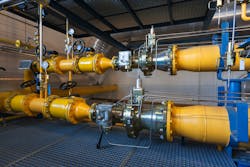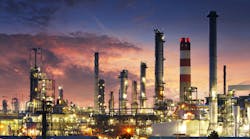As discussed last month, Coriolis mass, differential pressure, positive displacement, thermal, turbine and vortex shedding flowmeters are often specified for natural gas service. Insertion flowmeters using some of these technologies are also available.
Presuming that a flowmeter is calibrated for the North American Energy Standards Board (NAESB) typical natural gas, differences in natural gas composition compared to the NAESB typical natural gas composition, discussed in previous articles, can potentially introduce flow measurement errors into all of these flow measurements and corresponding energy flow calculations — albeit in different ways.
These composition differences can affect the density, thermal properties and heat content of the natural gas flowing through the flowmeter. It is strongly suggested that the specifications for these flowmeters include the actual natural gas composition (typically available from the local gas utility). Flowmeters that are affected by composition changes include:
- Differential pressure flowmeters measure approximately ½ percent higher (or lower) for each percent decrease (or increase) in density
- Most thermal flowmeters
Flowmeters that are not affected by composition changes include:
- Coriolis mass flowmeters use the properties of mass to measure the mass flow
- Positive displacement flowmeters measure the actual volume
- Thermal flowmeters in which the user can configure the actual natural gas composition in the field
- Turbine and vortex shedding flowmeters measure flow velocity to infer volume
It is important to recognize that composition changes can affect the heat content of the natural gas, which can adversely affect the accuracy with which the calculated amount of thermal energy flowing through the flowmeter can be determined. Absent an analyzer or calorimeter, natural gas composition differences from the NAESB typical composition can affect the inferred energy flow of all flowmeter technologies with the exception of some thermal flowmeters that can calculate the heat content of the gas for the configured composition.
David W. Spitzer is a principal at Spitzer and Boyes, LLC, which offers engineering, focused market research, writing/editing white papers, strategic marketing consulting, distribution consulting, seminars and expert witness services for manufacturing and automation companies. Spitzer has written more than 400 technical articles and 10 books about flow measurement, instrumentation and process control. He can be reached at 845-623-1830 or via spitzerandboyes.com.


